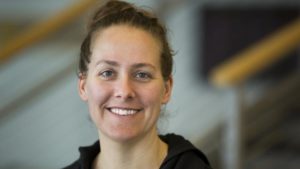The Secure Cloud Manufacturing research is developing techniques to make large-scale manufacturing systems safer, more secure, and more productive, enabling them to produce high-quality products for consumers at modest cost.
This project utilizes a small manufacturing system that consists of three industrial robots, four machine tools, and two conveyors, with an integrated industrial control system (from Rockwell Automation) connected by Ethernet/IP. The testbed is instrumented with presence sensors, inspection cameras, an interactive HMI display, and a computer for synchronization of real-time and historical data to a cloud platform. The research goals around the testbed include control development and validation, learning control, agent-based control, optimizing scheduling, reconfigurable control, cloud-based manufacturing, security of cyber-physical systems, etc. One key enabler for the research program is having simulation models of the different system components that can be validated off-line, or in a hardware-in-the-loop framework. Another key enabler is the hosting of testbed-generated data in a deployed cloud environment to enable real-time cloud analytics, predictive maintenance, and remote system monitoring.
We also support activities with pre-college students to promote education in science and technology.
Meeting time and location:
Meeting time and location:For academic credit, our MDP course is classified as a hybrid course but will mainly meet remotely, following university public health informed guidelines. Our MDP team meets Thursdays at 3:00pm–4:30pm ET using video conferencing. Each subteam arranges a convenient time to meet and work together following university guidelines. A two-term commitment will begin January 2021.
Team organization:
This team has three subteams: Controls & Automation, Cloud & Cyber Security, and Modeling & Simulation. Each of three subteams has a student team leader that reports to and meets with the faculty PI and graduate supervisors. The teams are flexibly structured to enhance creativity and opportunity for student growth.
More information
First year through graduate students are welcome to apply, and all will be encouraged to stay on the team for more than the two-semester minimum. Leadership roles are available in the lab, and experienced students will be a natural fit for these positions as their knowledge grows over time.
Students apply to a specific role on team as follows:
Controls and Automation Subteam (3 Students)
Specific Tasks: Machine learning, model-based control and optimization, quality analysis, computer vision, predictive maintenance algorithms, additive manufacturing enhancements, collaborative robot program development
Likely Majors: Computer Science (CS) (All), Computer Engineering (CE), Electrical Engineering (EE), Mechanical Engineering (ME), Aerospace Engineering (AE), Physics, Robotics, Manufacturing
Cloud and Cyber Security Subteam (3 Students)
Specific Tasks: Cybersecurity implementation, cloud system design, database creation and management, data analytics and verification, machine learning, software defined networks
Likely Majors: Computer Science (All), Data Science, Manufacturing
Modeling and Simulation Subteam (3 Student)
Specific Tasks: Manufacturing system modeling, digital twin development, application development, discrete event simulation, machine learning, augmented/virtual reality application development, virtual commissioning
Likely Majors: Mechanical Engineering (ME), Electrical Engineering (EE), Industrial & Operations Engineering (IOE), Computer Science (All), Data Science, Manufacturing
Apprentice Researcher (3 Students)
Specific Tasks: Interest in project material, willingness to develop skills. Open to first-year and second-year undergraduate students ONLY.
Likely Majors: Any
Faculty Sponsor

Kira Barton, Ph.D.
Associate Professor, Mechanical Engineering
Dr. Barton is an Associate Professor in the Mechanical Engineering Department. Since joining the University of Michigan’s Mechanical Engineering Department in 2011, Dr. Barton has spearheaded the Barton Research Group (BRG). In 2017, Dr. Barton received the ASME Dynamic Systems and Control Division (DSCD) Young Investigator Award and honored as a Miller Faculty Scholar.
Her primary research focus is precision coordination and motion control for emerging applications, with a specialization in iterative learning control. Dr. Barton works at the intersection of controls and manufacturing, combining innovative manufacturing processes with enhanced engineering capabilities. The potential impact of this research ranges from building high-resolution DNA sensors for biological applications, to the integration of advanced sensing and control for rehabilitation robotics.

Z. Morely Mao, Ph.D.
Professor, Electrical Engineering and Computer Science
Dr. Mao is a professor of Electrical Engineering and Computer Science. She is a recipient of the Sloan Fellowship, the NSF CAREER Award, the ARMY YIP Award, and an IBM Faculty Award. Her other honors include the Morris Wellman Faculty Development Professor and EECS Achievement Award at University of Michigan.
She has played a leadership role in several large research efforts funded by the government as well as industry leaders, including AT&T and IBM. Her group has successfully leveraged its research to develop several prototypes that have been converted into commercial products through close collaboration companies such as AT&T, Google, and Docomo. Additionally, software prototypes focused on mobile platform characterization, such as MobiPerf and Powertutor, have been open-sourced and widely used by researchers in academia and industry.
Students: 9 – 12
Likely Majors: Any, AE, CS (All), CE, EE, IOE, Manufacturing, ME, ROB, SI, Any
Summer Opportunity: Summer research fellowships may be available for qualifying students.
Citizenship Requirements: This project is open to all students on campus.
IP: Students who successfully match to this project team will be required to sign an Intellectual Property (IP) Agreement prior to participation in January 2021.
Course Substitutions: Honors
